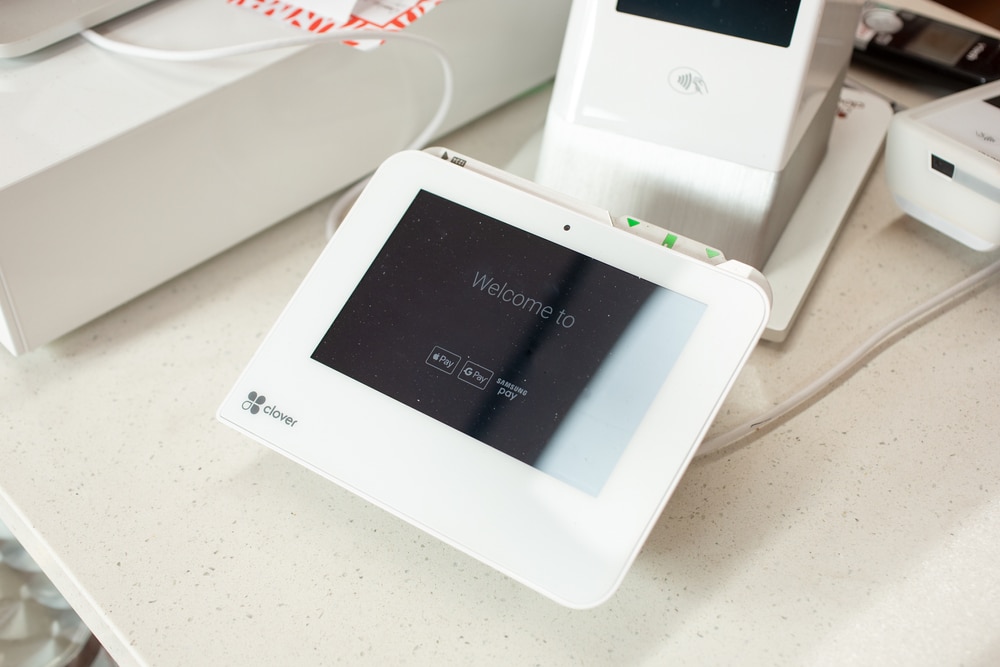In the fast-paced world of small business, the difference between surviving and thriving can be keeping up with the latest trends, which is challenging when you’re trying to juggle all the daily tasks of running a small business.
These days, it’s more apparent than ever that Point-of-Sale (POS) systems are no longer just cash registers – there’s potential for your POS to be your new business partner. In fact, if you’re still using your POS merely to process payments, you’re missing out on a wealth of opportunities a POS can offer to streamline operations, enhance customer service, and supercharge your growth.
Whether you own a pet grooming business, your own tattoo studio, or you’re an artist selling your work at local markets, a tasty food truck, or any other small business, there is a perfect POS system to match your unique needs. So, let’s discover what your POS system can do for you.
This guide will dissect the top POS software solutions for small businesses in 2024. We’ll explore their key features, pricing, and real-world benefits that can help elevate your business to new heights.
What is a POS System?
Put simply, a Point-of-Sale (POS) system includes the hardware and software businesses use to process customer payments for products and services. In the pre-internet days, POS systems were physical cash registers that accepted cash, checks, and, eventually, credit cards. Now, modern mobile POS software and credit card readers do much more.
By enabling businesses to process payments from anywhere, including contactless payments like Apple Pay and Google Pay, POS systems serve as essential business hubs, handling inventory, customer and employee management, accounting, payroll, and even shipping services.
Why is a POS System Important for Small Businesses?
A POS system is an essential component of small business success. It eliminates countless manual tasks that consistently frustrate and waylay small business owners. No matter your small business type, a POS system can help you streamline operations, improve customer service, and grow your business.
The best POS software can help small businesses in a number of surprising ways, including:
- Accepting payments from a variety of sources, including credit cards, debit cards, and mobile wallets
- Tracking inventory levels, making reordering products simpler
- Managing customer loyalty programs and discounts
- Generating reports on sales and expenses
- Providing insights into customer behavior
- Saving countless time previously spent on administration paperwork
- Reduced errors in sales data recording
- Access to comprehensive sales reports and analytics
But, all POS software is not created equal. And for good reason. Small businesses run the gamut across industries and geographical locations, and their POS needs vary. This is why, when choosing a POS system (or any business software) for your small business, it’s essential to consider the features that are most important to you.
Let’s explore some essential features of the best POS systems to see what software will best serve your business needs.
Essential Features of a POS System for Small Businesses
A modern POS system is much more than a cash register. These days, POS systems provide a myriad of features designed to cater to the diverse needs of small businesses.
Below, we review some of these features and unpack some examples to see how these features could benefit your small business:
Credit Card Processing
Perhaps the most obvious feature of POS systems is payment processing. Secure, reliable, and efficient credit card processing capabilities are vital for the modern consumer. Imagine a cozy local gift shop that previously only accepted cash or checks, significantly limiting its customer base. The shop can attract a more extensive customer base by integrating a modern POS system that supports various payment methods, including credit card processing and tap-to-pay. With that increase in revenue, the business could expand to online sales or advertise on social media.
Appointment Scheduling
For businesses that rely on appointments, a POS system can streamline the scheduling process, helping you easily manage calendars, payments, and appointment scheduling. Take a hair salon, for example. Before DaySmart Salon, scheduling appointments was a manual and time-consuming process with the constant risk of miscommunication, resulting in double-booked stylists. However, some POS systems today offer an integrated appointment scheduling feature, allowing a salon to efficiently manage appointments, reduce scheduling conflicts, and even send automated reminders to customers, reducing no-shows.
Modern Marketing
Integrated marketing tools allow you to connect with your customer base, run promotional campaigns, and nurture customer relationships. Consider a small tattoo and piercing studio. In the past, it relied on traditional advertising methods and couldn’t effectively engage with its customer base. But with a modern POS system, the studio can collect customer data and text or email personalized offers, loyalty discounts, or even seasonal promotions. For a fraction of traditional marketing budgets, the studio not only boosts customer loyalty but also increases bookings and sales.
Business Reporting
Small business owners have to wear a lot of hats, which can be exhausting. That’s why many POS systems offer a deep dive into your financial and operational data, empowering you with the insights needed for growth. Think about a local doggie daycare. Before adopting a POS system, the owners had limited visibility into detailed data regarding their day-to-day performance. With the implementation of a POS system, they can now access automated reports on daily, weekly, and monthly sales. Reports that help identify peak hours and seasonal trends, and even calculate profit margins accurately.
Employee Management
Many small business owners simplify payroll management by integrating employee management tools into their POS system, ensuring accurate and timely employee compensation. Let’s consider a small day spa that employs several staff members. Employee management used to be a time-consuming and error-prone task. However, incorporating employee management into a POS system is remarkably efficient. Automatic payroll calculations ensure that employees are accurately compensated, saving time and eliminating payroll errors. Plus, some POS software, like DaySmart, will also include commission tracking, goal setting, and even the ability to manage independent service providers.
Inventory Management
A POS system can allow small business owners to track inventory levels in real-time to avoid stockouts and overstocking. Plus, the system collects necessary data to identify your best-selling products and trends. For example, a professional makeup artist running their own business might benefit from a POS system that can keep track of supplies and ensure they have the tools and items they need, when they need them most.

Top 6 Best POS Systems for Small Businesses
Choosing the best POS software is a critical decision point for small businesses. And, in the modern world, new solutions are always on the rise.
That’s why we’ve created a curated list of the best POS systems for small businesses in 2024, each with its own unique features and pricing details:
#1: DaySmart
DaySmart offers appointment scheduling and business management POS solutions for small and service-oriented businesses, such as salons, tattoo studios, and more. Distinguishing itself by offering integrated credit card processing, DaySmart simplifies and accelerates the whole payment experience by allowing business owners to take deposits online to secure appointments, charging no-show fees, and offering easy-to-manage membership packages. Additionally, DaySmart offers automated payment reconciliation and reporting and the ability to store client payment information for swift, repeat transactions. Plus, DaySmart makes it easy to enhance client relationships through customized gift card sales and advanced contactless payment options, all while ensuring top-notch security and data protection.
#2: Toast
Toast offers a versatile pricing structure with a starting cost of $0.00 per month, making it an affordable choice for small businesses, particularly restaurants. There are no initial fees, meaning you can start without significant upfront investment. While a mobile card reader is not included, Toast compensates by providing an array of smart restaurant management tools. Toast’s system lets small business owners customize the software so you only pay for tools and features you need, saving unnecessary extras. Additionally, the credit card fee stands at 2.99% plus $0.15, which is competitive in the market. Toast is an excellent option for businesses looking for affordability, flexibility, and robust restaurant management tools.
#3: Clover
Clover is an all-in-one POS system starting at $35 per month. It goes beyond basic payment processing, offering features that allow you to track sales and inventory efficiently. With Clover, you can also manage employees seamlessly. Furthermore, it supports a variety of payment methods, including chip, swipe, tap, and NFC (Apple/Google/Samsung Pay). Although Clover offers an option for appointment scheduling, this requires an additional monthly fee through an integrated partner and isn’t part of the Clover system.
Clover is a solid choice for small businesses interested in offering online ordering, loyalty programs, and gift card options, enhancing customer engagement and retention. Plus, their credit card fees are lower than some, charging 2.3% with an additional $0.10 per transaction.
#4: Square POS
Square POS stands out for its transparent pricing, with a monthly starting cost of $0.00 and no initial fees. But this free version is limited in features and upgrades. The most significant difference with Square is the inclusion of a free mobile card reader, which isn’t the case for all POS software. However, the free reader is swipe only while the wireless card reader (what’s most common in businesses these days) costs an additional $50. Besides payment processing, Square offers a website builder, simplifying the process of establishing a digital presence. The credit card fee is competitive at 2.6% plus $0.10 per transaction. Square is particularly suitable for those who seek simplicity, affordability, and integrated website solutions.
#5: Shopify POS
Shopify POS offers a flexible pricing structure, starting at $29.00 per month, with a free mobile card reader included. One standout feature is multichannel inventory management, allowing businesses to integrate products across various sales channels. A unique trial price of $1 per month for the first three months is available so businesses can explore the system’s capabilities at minimal cost. Shopify also provides a customizable POS terminal with integrated hardware, streamlining transactions. Shopify is a simple system that’s an excellent option for small businesses and stores looking for support managing inventory and offering a seamless shopping experience. The credit card fee for Shopify POS is competitive at 2.7%.
#6: Lightspeed Retail
Lightspeed Retail is a comprehensive POS solution starting at $69.00 per month. While it does not include a free mobile card reader, it offers specialized solutions for various industries, including restaurants, retail, and even golf courses. With over 150,000 customer locations worldwide and 18+ years of experience, Lightspeed has a proven track record of working with local businesses. It operates as a multichannel platform with advanced inventory management, making it suitable for many small businesses, although Lightspeed primarily caters to retail and restaurant entrepreneurs, providing industry-specific features. The credit card fee is competitive at 2.6% plus $0.10.
Tips for Choosing the Right POS for Your Small Business
Selecting the best POS system for your small business requires careful consideration. Here are a few tips to guide you through the decision-making process:
Assess Your Business Needs
Making the right choice can often start with a good old list. Start by writing down what you want to accomplish with this new system. Do you just need to take payments? Or could your internal processes use an overhaul? Do you want to combine your CRM system with this POS system? Are you considering integrating other software? Know what your business needs before you search for the perfect POS, or you may wind up with a system that won’t work for you.
Consider Scalability and Growth
Sure, it may seem like a perfect system for now. But what about when your CRM is twice what it is now? Or three times? Don’t sell yourself short when picking a POS. Think big! Consider your future growth goals and whether your POS will grow with you as your small business expands.
Take Advantage of Free Trials and Demos
Not sure what will work best for you? Try a few first! Most software companies offer free demos (usually 14-30 days) for you to explore a new POS system fully before committing to it long-term.
Budget and Long-Term Value
Balance your need to be frugal, especially in the early days of a small business, with the projected long-term value of a POS system. Sometimes, thinking ahead by investing in a more feature-rich solution pays off in the long run.
Research Customer Reviews and Testimonials
There’s nothing like a first-hand account to provide the proof you need to make the right choice. Read through customer reviews and testimonials—not just the five-star ones on the homepage of a business’ website—to find out what works and what needs improvement for potential POS systems.

Frequently Asked Questions (FAQs)
- What does a POS system do? Mobile POS software and credit card readers enable businesses to process payments from anywhere and serve as essential business hubs.
- How do I choose the right POS system for my small business? Selecting the right POS system is no easy task. Small business owners must assess business needs, consider future scalability and growth, take advantage of free trials, balance the budget, and research customer reviews.
- How much does a POS system cost? The cost of a POS system varies based on the provider and the features you’re looking for. Pricing structures also vary and may include monthly, starting, or transaction-based fees, so read carefully!
- What is the difference between a POP and a POS? A POP (Point of Purchase) typically refers to the physical location of a transaction, such as a checkout counter. A POS (Point of Sale) includes the hardware and software used to process the transaction.
- What should a good POS system do? An all-inclusive mobile POS system should be able to process payments as well as handle inventory, customer and employee management, accounting, payroll, and shipping services.
A well-chosen POS system can be a game-changer for small businesses. It not only streamlines operations but also empowers your business with the immediate and relevant data needed to make informed decisions. This winning combination enhances profitability and cultivates a more satisfying customer experience.Ready to find an integrated POS solution for your business? Explore DaySmart products here to find the best fit for you.

